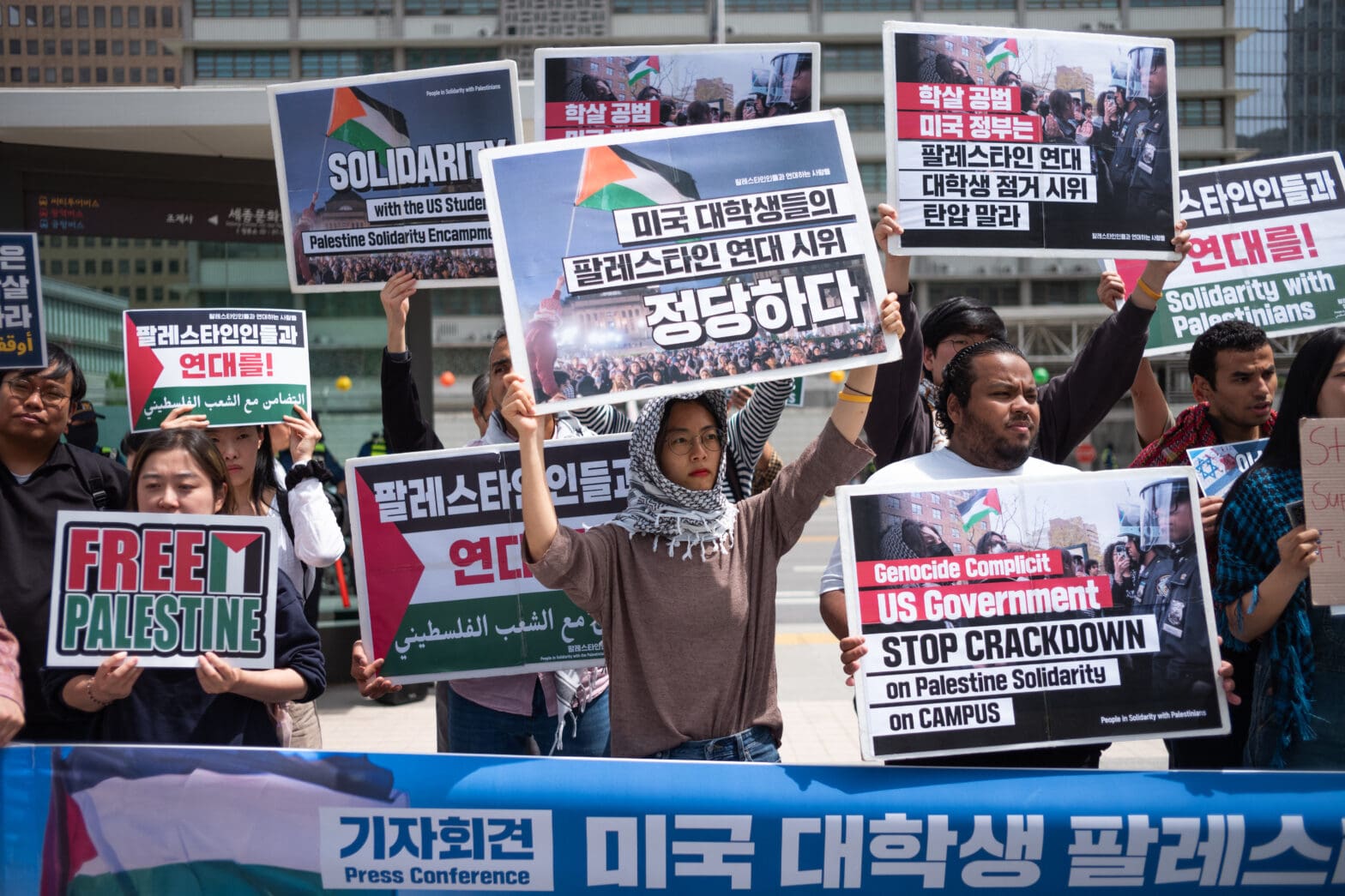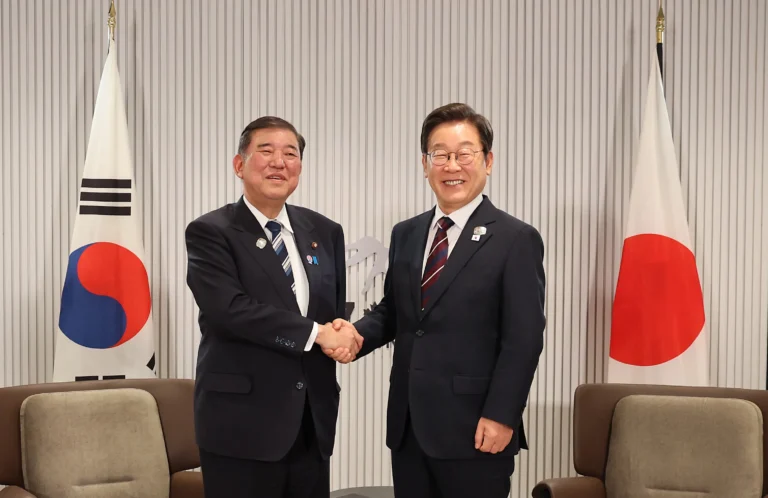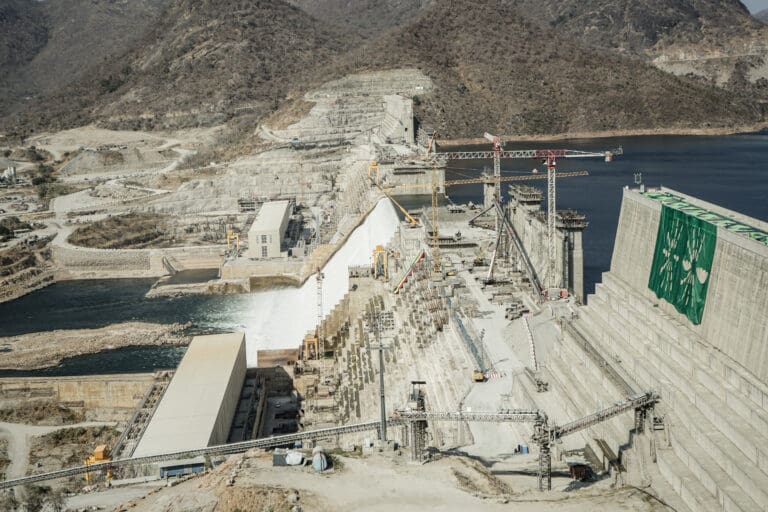
The Case for Palestine:
Why Japan and South Korea Should Recognize Palestinian Statehood
Policy Note, July 2024
Israel’s devastating assault on Gaza, which continues with impunity, highlights the impotence of multiple United Nations (UN) resolutions1 and current cases at the International Criminal Court (ICC) and International Court of Justice (ICJ).2 As pressure to end the war grows, Israel is becoming increasingly isolated internationally, as even its strong backers like United States Senate Majority Leader Chuck Schumer have warned.3 As global opposition to the ongoing genocide continues, some European countries have shifted position on Palestinian statehood—as seen most recently in Norway, Spain, and Ireland’s coordinated and symbolically powerful recognition of the State of Palestine.4
As of June 2024, 148 of the United Nations’ 193 member states had recognized the State of Palestine (Map1). In Asia, there were two notable absentees from this list: Japan and South Korea. Given the unfolding genocide in Gaza, if they are to align their interests with their values, now is the time for both nations to recognize Palestinian statehood. Recognition would add further pressure on Israel to end its military occupation, acknowledge the Palestinian right to self-determination, and provide a pathway towards a meaningful and durable solution.
Source: Palestinian Ministry of Foreign Affairs.5
Historical Context
In recent decades, Japan and South Korea have both expanded their political, economic, and security relations with various countries across the Middle East and North Africa (MENA). Both east Asian states have pursued a cautious approach toward the Israeli-Palestinian conflict. They have deepened their ties with Israel and, at the same time, consistently supported a two-state solution and provided significant humanitarian aid to Palestinians.
Following the oil crisis of the early 1970s, and facing growing energy needs, Japan sought to build good relations with Arab nations and supported Palestinian self-determination—a key political cause for Arab states, especially at the time. In the late 1970s, Japan began officially engaging with the Palestine Liberation Organization (PLO), allowing it to open an office in Tokyo but not granting the organization diplomatic status.6 Japan has supported the UN Relief and Works Agency for Palestine Refugees in the Near East (UNRWA) since shortly after its establishment, providing the Palestinians with humanitarian aid and support for infrastructure development.7 Japan also became one of the largest contributors of development aid to the Palestinian Authority (PA) after its creation in 1994.8
South Korea maintained a relatively low profile in the Middle East in the 1970s, primarily concentrating on building and reinforcing ties with influential regional players such as Saudi Arabia, Egypt, and Israel, driven by economic and strategic considerations. However, in the late 1980s, it took a significant step by supporting UN General Assembly Resolution 43/177. This resolution acknowledged the proclamation of the State of Palestine by the Palestine National Council and determined that .”9
Despite this acknowledgment of Palestinian aspirations, both Tokyo and Seoul have thus far resisted calls to formally recognize Palestinian statehood. While both have established diplomatic ties and opened representative offices (Japan in Gaza in 1998, and South Korea in Ramallah 2014), neither yet officially recognizes it as a state. This is most likely a consequence of their ties and coordination with their closest ally, the United States. Since World War II and the Korean War, their alliance with the U.S. have been a cornerstone of the security architecture of both states.10
Washington insists that any change in the status of Palestinians should come through direct negotiations between Israel and Palestine, adhering to the framework of a two-state solution. Both Japan and South Korea have followed suit. This alignment can be seen in their historical voting patterns on Palestine/Israel-related resolutions at the UN Security Council and the General Assembly. In addition, over the past two decades, both countries have cultivated closer relations with Israel. South Korea in particular has developed stronger ties in the technology and defense sectors.11
Recognition as a Moral and Legal Imperative
While this balancing act has served both countries to date, the unfolding genocide in Gaza may force them to reconsider their stances. Thus far, the war has killed at least 36,000 Palestinians, including a significant number of children. According to the United Nations Children’s Fund (UNICEF), Gaza is now the most dangerous place for children in the world.12 Much of the infrastructure of the Gaza Strip has been destroyed, including hospitals, schools, and universities.13 While Israel continues to act with impunity, recognition of Palestinian statehood would send a clear message to Israeli policymakers that key Asian powers, such as Japan and South Korea, support an end to the ongoing genocide and long standing conflict, and a pathway to a two-state solution.
The war on Gaza is also highlighting the erosion of international law and the fragmentation of the post-World War II rules-based order, from which both Japan and South Korea have benefited greatly in terms of their economic development and security. As leading advocates for international law and human rights, Japan and South Korea would enhance their global standing by recognizing Palestinian statehood and further demonstrate their commitment to justice and equality.
The principle of self-determination is enshrined in international law, notably in the UN Charter (Article 1) and the International Covenant on Civil and Political Rights (Article 1).14 The Palestinian people’s claim to statehood is supported by their right to self-determination, which has been recognized and repeatedly endorsed by the UN since 1969,15 along with their right to determine their political status and pursue economic, social, and cultural development. The General Assembly granted Palestine the status of non-member observer state in 2012.16 This broad recognition strengthens the argument for statehood under international law.
The ICJ’s 2004 advisory opinion on the legal consequences of Israel’s construction of a wall in the Occupied Palestinian Territory reaffirmed the applicability of the Fourth Geneva Convention and highlighted the illegality of Israeli settlements.17 This opinion supports the argument that Palestine has a distinct legal status under international law. Both Japan and South Korea are parties to the ICJ and ICC and are thus bound by their rulings.
The war is also increasingly unpopular among Japanese and South Korean citizens. Students at universities in both countries have staged protests similar to those spreading across U.S. university campuses.18 Both Tokyo and Seoul have seen weekly protests against the war, signifying growing local opposition to the ongoing conflict.19
Recognition Serves National Interests
While Japan and South Korea have tended to align with the U.S. when it comes to Middle East policy, the war on Gaza is one issue where following Washington’s lead could come at the cost of reputational harm. According to the Arab Barometer, public favorability towards the U.S. across the Middle East has nosedived since October 7, 2023.20 Japan and South Korea have spent decades building up their soft power across the MENA region, by supporting humanitarian efforts and contributing aid for development.21 Following unpopular U.S. policies could jeopardize the reputation they have both built with publics across the region. To maintain their good relations with the states and peoples of the Middle East, Tokyo and Seoul should dissociate themselves from the ongoing aggression on Gaza, both diplomatically and economically.
Japan and South Korea both import the majority of their energy from the Middle East,22 and the region provides vast export markets for the two countries’ industries, ranging from infrastructure and technology to the automotive and defense sectors. Israel’s ongoing assault is a significant source of instability in the region, which could directly harm both countries’ energy security and trade. Thus, both have a stake in promoting regional stability to protect their economic and security interests. Recognizing Palestinian statehood would add to growing global pressure for a ceasefire. Regional stability would also benefit global markets and international security more generally, aligning with Japan and South Korea’s broader strategic interests.
It Is Time to Recognize
Last month, both Japan and South Korea voted in favor of a UN General Assembly resolution on the admission of the State of Palestine as a full member of the multilateral body.23 The two east Asian states could consolidate their support for the Palestinian right to self-determination by recognizing Palestinian statehood, joining the overwhelming majority of the international community. By contrast, their alignment with deeply unpopular U.S. policies in the Middle East, particularly in the context of the ongoing conflict in Gaza, risks inflicting reputational harm and eroding the soft power both countries have cultivated over decades in the region.
The principle of self-determination, which supports the Palestinian claim to statehood, is enshrined in international law. Recognition by key Asian countries like Japan and South Korea would send a powerful message to Israel and the international community that the conflict must end, leading to a two-state solution. Indeed, their historical and ongoing support for international law further compels them to act. Countries around the world cannot continue to follow the U.S. policy of demanding negotiations as the only pathway to statehood when it is clear that Israel has no intention of engaging in serious negotiations or ending its occupation. This is evidenced by its de facto and de jure annexation of occupied territory, and repeated statements by its leaders.
Naturally, recognition of Palestinian statehood is not without its risks. Such a move by either country would be likely to strain relations with the U.S. and Israel. These risks could however be mitigated through diplomatic efforts highlighting that recognition is part of both states’ already declared commitment to a two-state solution. The countries’ diplomats could also stress that, given the extreme imbalance of power between Israel and Palestine and the ongoing expansion of illegal Israeli settlements, a negotiated ceasefire will be difficult without international pressure.
In conclusion, the recognition of Palestinian statehood would both fulfill a moral imperative and be an astute move, by which Japan and South Korea can act in accordance with both their values and interests. The ongoing conflict in Gaza, characterized by severe human rights violations and enormous loss of life, underscores the urgent need for international action.
As prominent advocates of international law and human rights, Japan and South Korea have a unique opportunity to enhance their standing across the MENA region by recognizing Palestinian statehood, thus demonstrating their commitment to justice and equality. While recognition would be symbolic, such a gesture of goodwill would reverberate across the Middle East and the Global South, showing the commitment of Japan and South Korea to international law and their opposition to the ongoing carnage in Gaza. It would also put both countries firmly on the right side of history.




